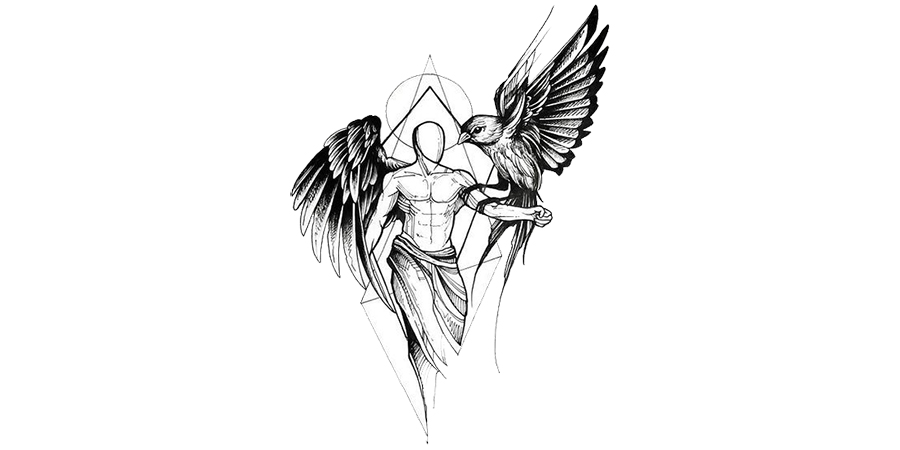Each of us human beings has an invisible friend and guide to accompany us on our journey through life and death. Whether it manifests as a still-small voice, an innate urge, vivid intuition or an actual entity, each one of us has a teleos, or purpose, particular to our own soul’s journey, negotiating the relationship between Self and ego according to our uniqueness.
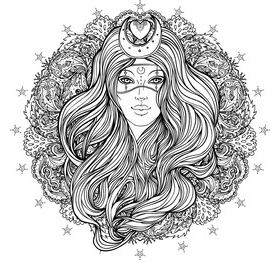
This friend, sometimes called “the Other” by Jungians, erupts into consciousness at times crucial to the equilibrium of psychological life and the path of individuation.
This friend, called The Holy Guardian Angel by magicians, or practioners of the Hermetic Qabalah, is the Angel (the term I will use in this article) that carries the call and is identified with the calling of our lives’ purpose and guides us on the way of becoming a person, a process that Jung called individuation. Through this mysterious process the Angel negotiates the tension of the opposites in service to the Self, and, as the guardian at the threshold between conscious and unconscious, acts as host of the invisibles: messenger of the gods.
This article is a study of the mysterious friend called the Angel. The concept of the Angel, or Daimon, is an ancient concept whose origins reach into civilization’s antique cultural heritage. In Plato’s myth of Ur, Socrates describes how the souls are sent to this world, each with an Angel or Daimon, “which the soul has chosen to be guardian of his life, and to fulfill that which he had chosen” (Shrine of Wisdom, 1984, p. 34). In The Republic Plato said,
“ When all the souls had chosen their lives, they went before Lachesis. And she sent with each, as the guardian of his life and the fulfiller of his choice, the Daimon that he had chosen, and this divinity led the soul first to Clotho, under her hand and her turning of the spindle to ratify the destiny of his lot and choice, and after contact with her, daimon again led the soul to the spinning of Atropos to make the web of its destiny irreversible, and then without a backward look it passed beneath the throne of Necessity. (quoted in Hillman, 1996, p. x) ”
Thus the Angel or Daimon is not only guardian over but also the guide through our human lives. It is linked to one’s individual calling, the path one’s individuation will take. In The Soul’s Code, James Hillman (1996) explained that the Daimon is the seed behind the calling that brings about one’s fate. His ‘acorn theory’ holds that “each person bears a uniqueness that asks to be lived and that is already present before it can be lived” (p. 6). This guardian of life and messenger of the soul’s calling is an important figure in countless civilizations:
It is a teaching of Moses that every believer has an angel to guide him as a teacher and a Shepard” (St Basil); and Christ says of ‘the little ones’ that their angel’s in heaven always behold the face of the Father. In Zoroastrian belief, the soul after death meets a beautiful maiden who announces, “I am none other than thine own personal conscience. Thou has loved me in this form of sublimity, goodness, and beauty in which I now appear unto thee.” At the time of his ordination, a Taoist master is assigned a guardian spirit, called a pen-ming, which acts as a special liaison official to present the priest’s documents to the lords of the cosmos. Some authors (including Philo) believe that each soul possesses a good and a bad angel, who contend throughout life for its possession. (Wilson, 1994, p. 73)
Whether it manifests as a guardian spirit, ancestor, familiar or part of the soul, the Angel is a persistent archetype within many civilizations. Due to the limited scope of this article, and in the interest of focus, current study is limited to the Western manifestations of the Angel: Daimon, Genius, and Guardian Angel.
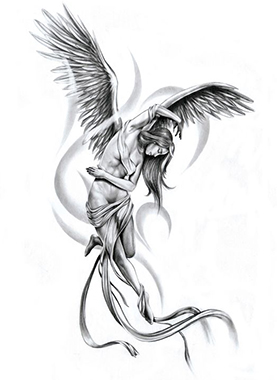
The Angel is an archetype with profound power, and tremendous import for the psyche. It is a messenger of the soul’s calling, and an archetype that guides the individuation process. This article examines its origin and teleos as they occur through the ages and in modern everyday life. Its mysterious message is highlighted by pointing to an archetypal essence that indicates a personal message for each and every person.
As an archetype, the Angel belongs to the portion of the psyche Jung called the objective unconscious. Archetypes are psychoid factors (Storr, 1983, p. 26), meaning that they can manifest on the physical and mental levels, and can be experienced in synchronicities. The unconscious is the timeless place where the archetypes exists, uniting one, in the symbolic life, with the ancients.
As a symbol, especially one that unites the opposites, the Angel has life as well as a transforming power in one’s own life. Jung felt that symbols were living things, and that the purpose of them was to transform libido, or psychic energy, from one form to another (Eisendrath, 1997). Anthony Storr (1983) explained that Jung described the collective unconscious as consisting of mythological motifs, or primordial images to which he gave the name “archetypes” (pp. 16-27). These potentials present themselves as both ideas and images; their presence is felt as numinous, as having profound spiritual significance and can possess one, causing one to behave in typical ways. Archetypes are often described as phylogenetic in origin, more akin to instincts or typical behavioral patterns than to metaphysical principles, however this article takes the more metaphysical approach, describing the Angel as an entity who is part of the psychic life of the Self. It is autonomous and in service of the Self which Jung called the ordering, whole-making principle of the psyche (Salman, 1999).
The Angel is a reconciling symbol that resolves inner tension in the service of the Self. As mediator between opposites, it serves as a messenger between the sometimes-opposing conscious and unconscious positions in life. The Angel manifests at crucial points in one’s life to mature one’s self on the path foreordained by the soul’s most intimate desires. These crucial points, called shipwreck by Robert Romanyshyn (1994b) are points where the ego is threatened with annihilation and its relationship to the Self is readjusted. Romanyshyn explained that the Angel brings an invitation at the shipwrecks in one’s life. This invitation is an opportunity that the Angel can hold, the transformative process known as the transcendent function. C. G. Jung (1916/1969) said that the transcendent function unites the opposites of conscious and unconscious in ways that affect a psychological shift in attitude.
The tendencies of the conscious and the unconscious are the two factors that together make up the transcendent function. It is called “transcendent” because it makes the transition from one attitude to another organically possible, without loss of the unconscious. (p. 279)
This shift in attitude may result in small changes in the personality, a new approach to life, or even a new identity. Although the Angel is not identical to the transcendent function, the message it carries, and the experience it conveys, constitute an invitation to transcend. The Angel’s presence indicates an incursion from the transcendent realm of the Self, the objective psyche, and serves to unite one to it. James A. Hall (1983) further clarified this relationship between a reconciling symbol, or Angel, and the transcendent function that precedes it. “The ability of the objective psyche to form reconciling symbols is called the transcendent function because it can transcend the conscious tension of the opposites” (p. 13). The reconciling symbol of the Angel acts as a messenger and interface between the Self and the ego, and as such heralds a transformational opportunity.
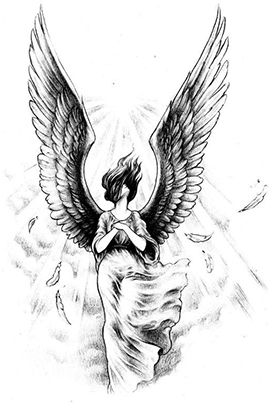
A study of the Angel is important to depth psychology and individual soul making (the art of interiorizing life through reflection) for many reasons. First, as an Archetype of individuation and guardian of one’s particular true-nature or calling, the Angel is an important ally in the work of becoming a person, and can be invoked to aid in the work between therapist and client. Another reason work with the Angel is important is that it aids in the work of bringing the soul back into psychology and everyday life. When one invokes the Angel, one honors the land from whence it comes, the realm of the imagination, and by paying heed to the symbolic life one returns “to the middle realm of fiction, of myth [which] carries one into conversational familiarity with the cosmos one inhabits” (Hillman, 1991, p. 58). Finally, studying the Holy Guardian Angel is participating in the study of the ancient philosophers and mysteries that have been part of the re-ensoulment of psychology from Jung to present day post-Jungians like James Hillman. “The reintroduction of the imaginal into Western psychology has even been called the ‘next great event after Freud’s insights about dream interpretation’” (Dennis, 2001, p. 46). This work is therefore part of a great renaissance of soul and imagination in psychology.
The Angel, Genius or Daimon is an archetype of antique origin and tradition. It is found at the root of the western philosophy, esotericism, mysticism, poetry and psychology: philosophers, poets, mystics and psychologists have courted the Daimon since the beginning of civilization. In fact, guardian spirits have been found in the ancient world throughout several cultures; thus, the archetype of the Angel is a multifaceted one, indicated by the many names and symbols that the ancients attributed to this being:
For centuries we have searched for the right term for this “call.”
- The Romans names it your genius.
- The Greeks, your daimon
- The Christians your guardian angel.
- The Romantics, like Keats, said the call came from the heart, and Michelangelo’s intuitive eye saw an image in the heart of the person he was sculpting.
- The Neo-Platonists referred to an imaginal body, the ochema,…your personal bearer or support. For some it is Lady Luck or Fortuna; for others a genie or jinn, a bad seed or evil genius.
- In Egypt, it might have been the ka, or the ba with whom you could converse.
- Shamans – Among the people we refer to as Eskimos and others who follow shamanistic practices, it is your spirit, your free-soul, your animal-soul, and your breath-soul. (Hillman, 1996, p. 9)
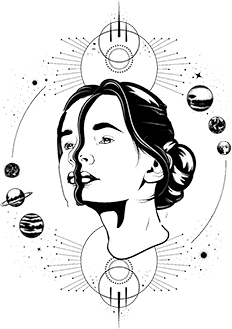
The story of the Angel is ancient indeed. It has appeared in the religious scriptures such as the Bible as the voice or presence of the lord, and was known as the Ka and sometimes Ba to the Egyptians. Probably the first recorded encounter with the Angel occurred at the time of Zoroaster, in about the fifth century B.C. An angel called the Good Mind, or Mana, came to the prophet as a messenger of God. Since this early account, the function of angels has been as a messenger. In fact, Robert Hauck (1994) said, “They basically have no essence, but they have a function. And the function is always inseparable from God” (p. 109).
“The term angel derives from a Greek translation of the original Hebrew Mal’akh which originally meant the ‘Shadow side of God,’ but later came to mean messenger” (Godwin, 1999, p. 7). The word angel was introduced through the Greek translation of the Torah known as the Septuagint:
In Sanskrit,…[the term for angel] is Angeres, a divine or celestial spirit that becomes the Persian angaros meaning “courier,” which appears in Greek as Angelos. It is through such routes that we finally arrive at the modern concept of an angel as being an intermediary or intercessionary between the Almighty and human mortals, between Eternity and our Universe of Time. (Godwin, 1999, p. 66)

The Greek Daimon, like the Guardian Angel, is a specific type of messenger sent to carry out the particular mission of each individual soul. In Webster’s New World Dictionary (Guralnik, 1970), it says that daimon means a divine power, fate, or god, and came to be known as an evil spirit. In Greek Myth, it is any of the secondary divinities ranking between the gods and men. It is a guardian spirit; inspiring or inner spirit and is sometimes confused with Demon. Finally, a daimon possesses one with power and vision.
In Greek literature, Homer references the Guardian spirit, the Daimon, as Athena (Wisdom), in the ancient saga of the Odyssey. Athena acts as both agency of the gods and holder of destiny for Odysseus. In this saga, Athena calls Odysseus to make the voyage back home and bring order back to the world. Merlin Stone (1988) writes of the trial of Socrates that in his first excuse of the Apology he stated that his Daimon, the private warning inner voice, or guiding spirit he claimed to possess) has warned him against his involvement in politics.
In Greek philosophy, Plato discusses the Angel under the title, the Daimon. Some of the earliest references to the Daimon can be found in the writings of Plato, an ancient philosopher born in Athens (c. 427- 347 B.C.), who has possibly influenced Western thinking more than any other philosopher. Plato’s writings take the form of dialogues using symbolic and mythological language; he mentions the Daimon in The Republic, The Phaedo, and The Timaeus.
In The Timaeus Plato (Taylor, 1976) explains how the hierarchies of the universe and how the daemons are given charge over “the fabrication of nature, and the care of bodies” (p. 284) and explains how his teacher Socrates described, in the myth of Ur, how souls are sent each with an Angel or Daimon:
When therefore all the souls had chosen their lives according to their lots they went forward in order to Lachesis, and she sent with each the angel (daimon) which the soul had chosen to be guardian of his life and to fulfill that which he had chosen. And the angel first of all conducts the soul to Clotho to ratify beneath her hand and by the whirl of the vortex of her spindle the destiny it had chosen in its allotted turn; and having passed from her presence brings it back to the loom of Atropos for her to make its destiny irrevocable. (Shrine of Wisdom, 1984, p. 34)
Plato also describes the Daimon or the Angel as a psychopomp who guides us on a treacherous, serpentine path through the underworld:
Thus it is said: that the daimon of each person, which was allotted to him while living, undertakes to lead each to a certain place, where it is necessary that all of them being collected together, after they have been judged, should proceed to Hades, together with their leader, who is ordered to conduct them from hence thither . . .. The journey therefore, is not such as Telephus asserts it to be in Eschylus. For he says that a simple path leads to Hades: but it appears to me that the path is neither simple nor one. For there would be no occasion of leaders, nor could any one ever wander from the right road, if there was but one-way. But now it appears to have many divisions and dubious turnings: and this I conjecture from our holy and legal rites. (Plato, 1976, 149-150)
In The Human Soul in the Myths of Plato (1984), it is explained that, in the Timaeus and Phaedo, Plato suggests that the true philosopher, should cultivate a relationship with the Beautiful and that the way to do is, is through cultivating a relationship with the Angel. This relationship with the Daimon gives us the ability to exalt our souls to the comprehension of our own nature, and the nature of the Divine Mystery. Many commentators on Plato’s works also wrote about the Daimon, or Angel: Philo equates the Angel with reason and the logos of the Self (Mead, 1992, 161), and Xenocrates says that:
Plato states expressly that the individual or personal soul is the leading guardian Daimon of every man, and that no Daimon had more power over us than our own. Thus, the Daimonian of Socrates is the god or Divine Entity, which inspired him all his life. (Blavatsky 1931, p. xx)
The Angel in Counseling Psychology: A Powerful Ally
The Angel is a powerful ally for the field of depth psychology and the attainment of self-knowledge and transformation. The Angel is a guide and host to the hidden realm of invisibles who live in the life of the psyche, and carries the key to the mysteries of humans’ existence. As messenger of the Self it is a mediator to one’s true nature.
As agent of that Self it carries a potential for transformation. As a reconciling symbol its presence represents the goal of analytic work, to initiate the process of individuation in which the transcendent function may make its presence known. In these, and countless other ways, the Angel is indeed a powerful ally in developing a personality, to create the perfected solar man. Certainly, courtship with this powerful guide is useful to the art of counseling psychology. Angel can be told that we know it is there, and that we are ready to listen.
A personal relationship can be nurtured with this powerful ally and teacher that will help quicken the process of Individuation and creative exploration of our potential.In many ways the Angel may represent a powerful agent of change and an ally in therapeutic work. In therapy, the Angel may manifest as the reconciling symbol between the patient’s conscious and unconscious as well as between the patient and therapist. The Angel can provide clarity and guide the process by providing a face to one’s destiny. It can provide a voice to the unknown depths of the subconscious that are explored in the analytical process. The Angel is also a messenger of the gods, and can help affect a dialogue with the invisible host that live in the psyche.
The Angel helps us to keep our balance and avoid an egocentric psychology, which neglects the Self, or the weakness of cognitive behavioral techniques that lack imagination and ignore Soul. The Angel preserves a sense of depth and mystery that challenges us to be our wholes selves, not as centers of our own universe, as the ego would like, but as stars within the body of the World Soul, each a center complete only in its relationship to the whole and service to the soul.
Both Carl G. Jung (1989) and Joseph Campbell (1988) recognized that in order to become whole persons and a whole society we must recover a sense of personal meaning and purpose in life collectively and individually. Jung explained this necessity for mystery and the unknown:
It is important to have a secret, a premonition of things unknown. It fills life with something impersonal, a numinosum. A man who has never experienced that has missed something important…. The unexpected and incredible belong in this world. Only then is life whole. (1989, p. 356)
- This article is a summary of:
THE ANGEL’S CALL: THE ANGEL AND THE INDIVIDUATION PROCESS – Scott Duncan Gilliam ( 2004 )

